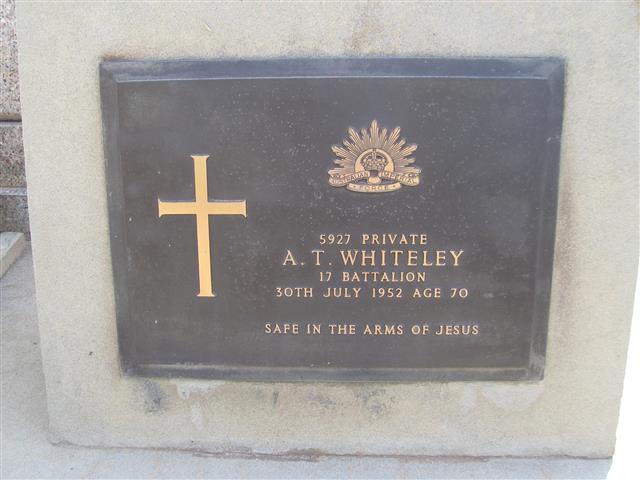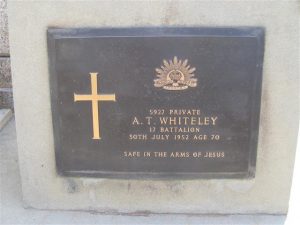Born in Orange in 1882, Alexander Tinnock Whiteley was the second child of Henry Whiteley and his wife Mary Ann (nee Dobson).
In 1910 Alexander married Eva Ivy Thomas and settled in Narromine, where his family lived.
On 23 May 1916 Alexander and two of his younger brothers – Charles Henry Whiteley and Richard James Whiteley – travelled from Narromine to Dubbo to enlist in the First World War. The brothers were issued sequential service numbers: 5926 (Charles), 5927 (Alexander) and 5928 (Richard).
The three brothers spent the next nine months together; they joined the 17th Battalion, 16th Reinforcements and attended Dubbo and Liverpool camps. The trio embarked HMAT A40 Ceramic in Sydney on 7 October 1916 and arrived in Plymouth on 21 November. Alexander and Richard were assigned to the 5th Training Battalion at Folkestone; and Charles to the 6th at Rollestone. In February 1917 Charles and Richard proceeded to the Western Front in France, however Alexander remained at Folkestone for a further three months, arriving on the Western Front in May 1917.
Private Alexander Whiteley was hospitalised twice following his arrival in France; in July with pyrexia (fever), and again in August, suffering from debility. He was transferred to the Royal Victoria Hospital at Netley in England, and in September to the 3rd Auxiliary Hospital. Alexander spent a month at Weymouth Camp following his discharge from hospital before embarking in late October for his return to Australia.
Whilst in Weymouth Camp Alexander received a letter from his sister-in-law Mary Katherine McAuley in Cootamundra, to which he immediately replied:
Dear Mary
I had a very pleasant surprise today when I received your letter. I was beginning to think that you had forgotten me, and had given up hopes of hearing from you again, as three of the letters I had written to you were returned to me from Cootamundra while I was in France.
I was sent away from the front in July and was in hospital in Rouen, a town in France until early in August. I was then sent to England and was in the British Red Cross Hospital at Netley near Southampton until three weeks ago. I am now in a camp near Weymouth waiting my turn for a boat home to Australia. I am permanently unfit for further active service.
I have had a very bad time, I do not think I will ever be strong again.I am sorry too have to tell you that my poor brother Dick has gone under. We had a very bad time on the 3rd of May, that is the day he fell, a piece of shell got him. Charlie is still with the Battalion, I had a letter from him a few days ago.
Well Dear Sister by the time you receive this I may possibly be on my way home again. I will write again before I leave for home. I will go to see you at the earliest opportunity when I get home.
Trusting you are all well I will say goodbye, with best love to all.
From your affectionate Brother
Alexander T Whiteley
Alexander arrived back in Australia in December 1917 and returned to his family in Narromine. He and Ivy had five children, but sadly, Ivy passed away in 1922, at just 34 years of age. The couple’s youngest child was only nine months old at the time.
In 1926 Alexander married Ollie Field in Orange. By 1930 the family was living in Stuart Town, where Alexander was working as a miner. The 1943 electoral roll indicates that the family had moved to Peisley Street in Orange, and Alexander was a munitions worker.
Alexander died in Orange Base Hospital in July 1952, aged 70 years. His obituary in the Central Western Daily reports that he was survived by his wife Ollie, six sons, eight daughters and 23 grandchildren.
Alexander’s brother Richard did not survive the war; he was one of eleven men from the Orange district who were killed in action at Bullecourt on 3 May 1917. Charles returned to Australia in May 1918.
The three brothers are commemorated on the World War I honor roll of St Andrew’s Uniting Church (formerly Presbyterian Church) in Narromine.


